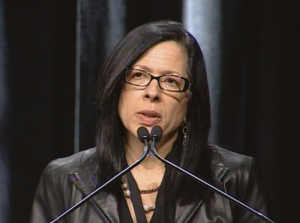This weekend, a controversy erupted at the American Association for Cancer Research (AACR) relating to Juno’s chimeric antigen receptor (CAR) T cell therapy following a series of tweets by Jonah Lomu, a keen biotech investor:
This innocuous looking tweet started a maelstrom of speculation and wild rumours that spiraled a little out of control. This was perhaps not helped by Dr Michel Sandelin being a little caught off guard after his presentation yesterday, essentially saying, ‘no comment’ and that the trials were stopped for ‘safety reasons’. Rather than calm things down, it unfortunately added fuel to the fire.
 Yesterday, we spoke remotely with Dr Renier Brentjens (MSKCC) off the record and ascertained that the furore, far from being a major incident that impacts the whole field negatively, was actually a tempest in a tea cup that has been blown out of all proportion.
Yesterday, we spoke remotely with Dr Renier Brentjens (MSKCC) off the record and ascertained that the furore, far from being a major incident that impacts the whole field negatively, was actually a tempest in a tea cup that has been blown out of all proportion.
After his invited presentation and Dr June’s discussion in the clinical trials symposium today, Dr Brentjens agreed to answer our questions on the record to provide some detail and straight facts to put things in context to address the concerns.
To learn what Dr Brentjens had to say in this exclusive interview, check out the full post – it makes for interesting reading:
Subscribers can log-in to read our latest insights or you can purchase access to BSB Premium Content.
This content is restricted to subscribers
Without much further ado, you can hear what Dr Brentjens has to say about the ‘safety concerns,’ interactions with the FDA and the CAR T cell therapy class effects in the brief, unedited, yet very candid interview below.
Please note that I’m here at the conference centre without a laptop or editing to tone down the background hubbub – this is the raw recording, which is just how I heard it live:
Some thoughts:
The two adult ALL deaths reported are unfortunate but should come as no surprise when considering these patients were mostly considered ‘salvage’ and very sick indeed. I think MSKCC and the FDA are rightly taking a sensible and cautious approach to patient safety while they consider the need for dose reductions before resuming the trials once IRB approval has been obtained. While the deaths were seen in the adult ALL study, the institution took a conservative approach and temporarily suspended all of the studies in that protocol group. I thought this was a measured response.
Tumour lysis syndrome and cytokine release syndrome are both, in some ways, a sign of great efficacy, as we have clearly seen with AbbVie’s Bcl2 inhibitor, ABT-199 in the past. The challenge with highly effective therapies, as always, is going to be learning how to expand the T cell production and induce tumour cell killing in a controlled way. Not every patient is going to be able to cope with the dramatic biologic effects that ensue, nor is the response consistent in every patient. Controlling the immune system response is not an easy task.
Interestingly, the neurotoxicity issues associated with confusion etc were also reported by Dr Kochenderfer in the Kite lymphoma trial at ASH, so it is unclear whether this is a class or dosing effect. It clearly isn’t limited to just the Juno therapy. No doubt this will be continue to be watched and monitored carefully once trials resume at a lower dose. We should remember that these are patients not only with poor performance status, but also with a very poor prognosis so the risk:benefit considerations are very different from a frontline trial in healthier patients.
Dr June brought up the issue of persistency and implied that the MSK/Juno construct had an effect for only a few weeks, while the UPenn therapy was longer (months). This was not my perception from all the data I saw recently at ASH and Dr Brentjens was quick to address this in the interview above.
My expectation is that a dose reduction will be quickly proposed, the exclusion criteria amended for co-morbidities and a revised IRB approved to all parties satisfaction, including the FDA.
We can expect more data on CAR T cell therapy at ASCO, where we will continue to follow the progress of this exciting class of immunotherapy. We should not expect it all to be plain sailing, there are bound to be a few periods of doldrums (challenges to be overcome) interspersed between the exhilarating and positive data that is being reported in very refractory and sick patients.
{UPDATE – April 19th, 2014}
We’ve literally just heard from Juno that the adult ALL study hold has now been lifted by the FDA and they are enrolling patients again.
This is really excellent news for patients and good work all around in getting the issue resolved so promptly, which is no mean feat.
Juno have confirmed that the clinical trials database has yet to be updated administratively (that will probably happen early next week after the Easter holiday weekend), but all five trials associated with the IND have had their hold removed and are recruiting.
 Yesterday, we spoke remotely with Dr Renier Brentjens (MSKCC) off the record and ascertained that the furore, far from being a major incident that impacts the whole field negatively, was actually a tempest in a tea cup that has been blown out of all proportion.
Yesterday, we spoke remotely with Dr Renier Brentjens (MSKCC) off the record and ascertained that the furore, far from being a major incident that impacts the whole field negatively, was actually a tempest in a tea cup that has been blown out of all proportion.